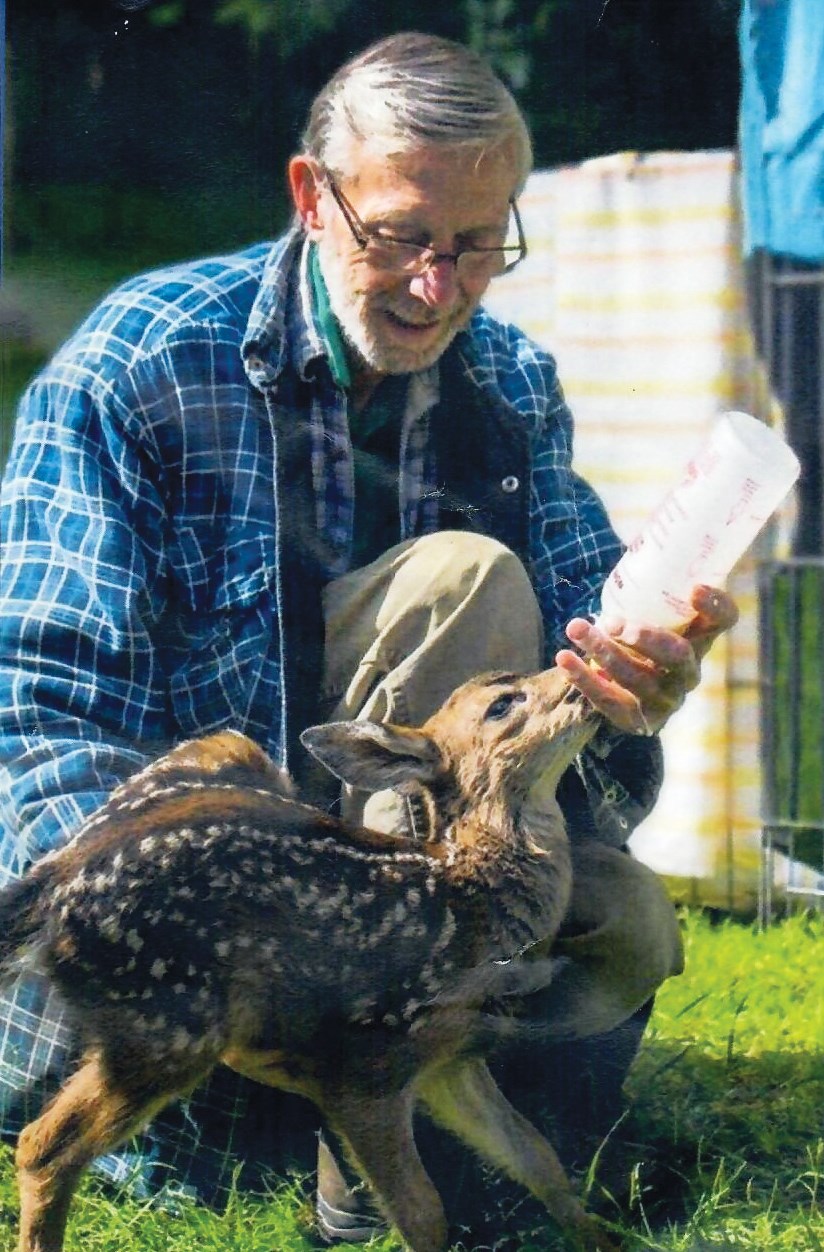On Monday afternoon, Devlin Funeral Home was packed with people paying their respects to Clint Davy, activist, artist and co-founder of the Gibsons Wildlife Rehabilitation Centre.
“He was a voice for those who didn’t have a voice,” said David Croal, a councillor for Gibsons who has known Clint for 30 years. “He was always there.”
Davy died Jan. 18. His wife, Irene, co-founder of the rehabilitation centre, was by his side.
Those who spoke at the reception following the service shared wildlife rescue stories celebrating Davy’s ingenuity, conviction and humility. “He definitely was never the one at the front of the parade, but you could rely on him,” said Don Kernan, a longtime volunteer at the rehabilitation centre and close friend.
“He always had an answer, always a solution,” said Cornelia Van Berkel, another longtime friend and former Sunshine Coast SPCA board member.
She recalled how Clint drove a young elephant seal from Sechelt to the rehabilitation centre in his van and showered him with water from a garden hose overnight while waiting for a team from the Vancouver Aquarium to arrive on the Sunshine Coast to complete the rescue. That seal, known as Rodney, was later released to the ocean off Vancouver Island. “Many rescues ended in happy endings,” Van Berkel said.
At 16, Clint moved from Inverness, Scotland, to Glasgow to join the Royal Air Force, where he served for 10 years. After marrying Irene, they immigrated to Canada in 1976 where he became immersed in animal welfare initiatives while working in the airline industry. He served as president of the Wildlife Rescue Association of B.C., OWL Orphaned Wildlife Rehabilitation Society and the Wildlife Rehabilitators Network of B.C. He also served on several boards, including for the Reifel Bird Sanctuary, Vancouver BCSPCA and the Provincial BCSPCA.
In 2012, he was honoured with the Queen’s Diamond Jubilee Medal for his volunteer service.
As a board member of BCSPCA, Davy was instrumental in stopping the electrocution of pound dogs. As an activist, he worked with renowned Canadian activist Paul Watson on a campaign to protect wolves in northern B.C. “I think he learned it on the street,” said Kernan of Clint’s drive.
He even tried his hand in politics. Environmentalist George Smith recalled how Davy once ran against former B.C. Premier Bill Vander Zalm “on principle.”
Together Clint and Irene founded the wildlife rehabilitation centre shortly after moving to the Sunshine Coast in 1988. Clint also played a key role in the development of the Sunshine Coast Branch of the BCSPCA in its early years.
Through coursework Clint increased his knowledge and gained qualifications as he pursued his life’s work, including serving as special constable through the Conservation Officer Service (COS) for eight years.
And it wasn’t just non-human animals that benefitted from Clint’s care. During the reception, one woman thanked the Davys for taking her in when she was temporarily homeless. “He wasn’t afraid to help people,” said Kernan, adding that Clint would also cover the veterinary bills for people’s pets if necessary, and would advise first responders, including local conservation officers, on rescues. “They trusted him,” Kernan said.
That includes Murray Smith, inspector for the COS on the Lower Mainland, who thanked the Davys in a speech at the reception, on behalf of the COS.
“When I met Clint for the first time, I learned one thing very quickly: shut up and listen,” he said. “I would be able to call Clint and Irene at any time at night, any time on the weekend, and they would be there… [Clint] was there for the animals, he was there for the Coast.”
Despite the loss, Kernan says the centre, a charitable society, is expected to continue operating. A new building on the property for rescued wildlife is nearing completion, and volunteers have been trained for callouts. And the service remains in demand. Last year alone, more than 350 sick, abandoned and injured animals were taken in. “The centre is going to be there,” Kernan said.



